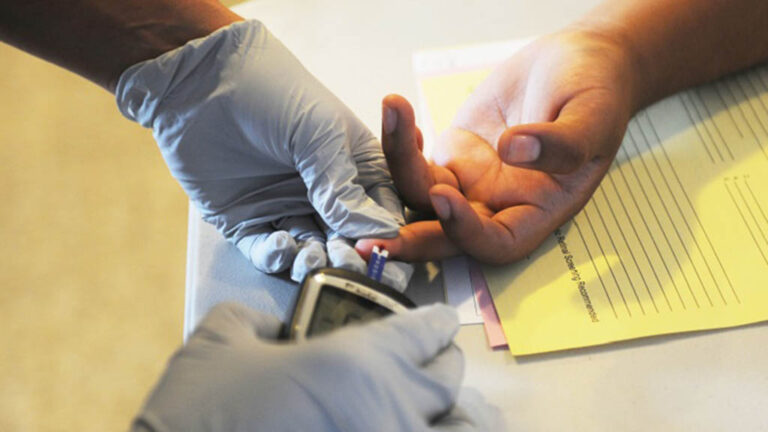
Diabetes is a disease that is caused by having too high levels of glucose, sugar, in the blood. Photo: Jessica A DuVernay
Of: Hanne Nordqvist
November 14 is World Diabetes Day. A new report shows that what was previously a so-called welfare disease is no longer a problem only in high-income countries. Now the number of diabetics is increasing instead, mainly in low-income countries.
November 14, 2019, News

Involuntary loneliness is as big a risk factor for dying prematurely as smoking - and a greater risk factor than overweight and physical inactivity, research shows.
Of: Pauline of Ekenstam
Involuntary loneliness is something that affects many older people. At the same time, researchers are sounding the alarm about the global prevalence of loneliness and the link to increased health risks. Loneliness must be taken seriously if we are to achieve the global goals for sustainable development - where "Good health and well-being" is one of the goals.
August 23, 2019, Chronicle

Climate change is closely linked to human health and our entire welfare, the debater writes.
Of: Rosanna Färnman
The United Kingdom, Germany, and Norway are some of the countries that have developed global health strategies. This week, the Ministry for Foreign Affairs and the Ministry of Social Affairs presented the publication Sweden's work with global health - for the implementation of Agenda 2030. The think tank Global Challenge welcomes the publication. Now there are deep dives, priorities, leadership and commitment.
November 6, 2018, Debate
Of: Ulrika Modéer
Sweden, through the development agency Sida, is at the top when it comes to gender equality work in global health. It shows a new report launched today. Now we must continue to work to engage boys and men in global health, increase the proportion of female managers in global health actors and create jobs free from sexism, writes State Secretary Ulrika Modéer.
March 8, 2018, Debate
Of: Pernille Fenger
Every year, half a million women worldwide fall ill with cervical cancer - and about half of them die from the disease. With the right political and medical efforts, the number of people affected by cervical cancer could be reduced by up to 90 percent, writes the UN Population Fund UNFPA.
February 20, 2018, Debate
Of: Alexander Gabelic, Anders Malmstigen and Mona Örjes
The Global Fund against AIDS, Tuberculosis and Malaria will receive SEK 2,5 billion from the Swedish development assistance budget over three years. The fund has now signed a cooperation agreement with the brewery giant Heineken - despite the fact that alcohol consumption has a clear connection to both HIV / AIDS and tuberculosis. Isabella Lövin and the Swedish government must act to stop the cooperation.
February 9, 2018, Debate
Of: Gunilla Källenius and Olle Stendahl
To fight the diseases of poverty is to fight poverty. Today, people in the world's poorest countries fall ill and die mainly from diseases such as malaria, tuberculosis, HIV, respiratory infections and diarrheal diseases. The declining support for research on global health is therefore unacceptable, write Gunilla Källenius and Olle Stendahl.
September 13, 2017, Debate
Of: Maria Sjödin
Homosexuals, bisexuals and transgender people generally have poorer health than the general public, not least in poor countries. However, health data for this group are often lacking. Now Sweden and the UN must invest in research that can improve the health, rights and well-being of LGBT people, writes the debater Maria Sjödin.
July 13, 2017, Debate
Of: Arvid Owl, Jonathan Rushton and Ulf Magnusson
Investments in improved animal health contribute in several ways to the implementation of Agenda 2030. It shows one new report from the Expert Group on Development Aid (EBA). Improved animal health gives poor animal keepers increased production and yields, and also reduces the spread of infectious diseases and multi-resistant bacteria. Sweden has unique experience of organized animal health work - these experiences should be used in international development cooperation, the authors of the report write.
March 7, 2017, Debate
Of: Anneli Rogeman, Annika Schabbauer, Annika Forests, Birgitta Göranson-Iliste, Bo Forsberg, Cecilia Chatterjee-Martinsen, Erik Lysén, Gabi Björsson, Kristina Henschen, Lisa Sjöblom, Lotta Sjöström Becker, Luis Lineo, Maria Andersson and Marianne Eriksson
President Donald Trump's reintroduction of the Global Gag Rule means that much of America's maternal health assistance is frozen - something that will affect those living in poverty the most. It risks significantly increasing the number of unwanted pregnancies and leading to the deaths of thousands of girls and women around the world. Now Sweden and the outside world must cover for the reduced aid. Therefore, 14 organizations in CONCORD Sweden's gender equality working group call on the government and the Riksdag to add new money to the spring budget.
February 23, 2017, Debate



